But for the RSS India wouldn’t have been a thriving democracy
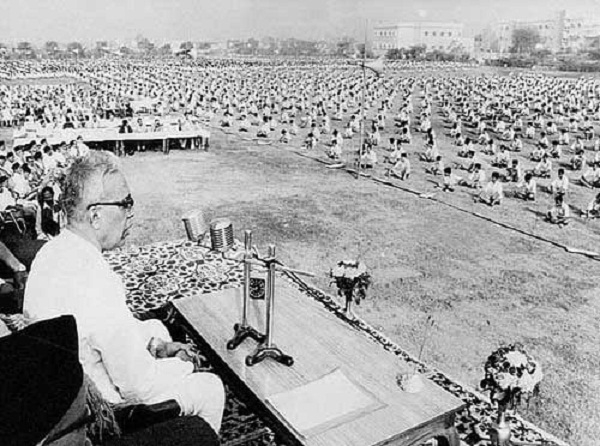
The then RSS Sarsanghchalak Balasaheb Devras addressing a rally of Swayamsevaks.
But that was a ploy; a trap to eliminate any kind of opposition to her in the wake of the June 12, 1975 historical verdict of the Allahabad High Court that set aside her election to the Lok Sabha on grounds of the use of corrupt practices. Scared of losing her power as Prime Minister that would have thrown the entire Gandhi-Nehru family out of the realm of power, she secretly hatched a plan in consultation with some of her very trusted lieutenants to hold the entire country to ransom for her power lust. And thus was imposed the Emergency.
This dark chapter of dictatorship in the history of Independent India was her first experience of suppression of freedom, of fear of the state machinery and a sense of helplessness for the citizens across the country. The shock and experience of the emergency made the people realize the importance of parliamentary democracy, its value to individual life and the contrast it presented to the experience of the Soviet and the Chinese brand of totalitarian regimes. The entire society right from the lowest rung of the society and the vast illiterate masses responded to this challenge and opportunity gallantly and wisely, established democracy more firmly than all the previous years could. The emergency galvanized the nation.
Three major incidents happened during this period. In the American democracy which is considered to be matured democracy, the President was impeached on charges of corruption and removed from the office. This happened in 1972 when two reporters of the Washington Post risking their life exposed the corrupt deals of President Richard Nixon in the Watergate Scandal. This entire episode stood exactly in sharp contrast with the “undemocratic” Indian Emergency with the famous “R Document” was banned in India.
At home there were severe droughts and famine in 1969, 1971 and 1972 affecting the agricultural production leading to steep price rise of the essential commodities. Corruption had become a common practice as Indira Gandhi had legitimized it as a “Way of Life”. The (dis)credit of introducing corruption in the public domain fifty years ago definitely goes to her. The entire country was sitting on a powder keg of vivid anger and unrest. At such juncture the late Jai Prakash Narain (JP) came forward and launched his ‘Sampoorna Kanti” (Total Revolution) movement involving students and the masses.
The RSS was observing these developments very keenly under the stewardship of Devras who described this emergency as an opportunity for a ‘big leap’ for RSS. Identifying the crisis as ‘battle of nerves’ –whoever remains without blinking will win, he predicted that this will last for a couple of years and what could not be achieved in twenty years could be achieved in these two years. And he proved the most prophetic on both these counts as the events unfolded later.
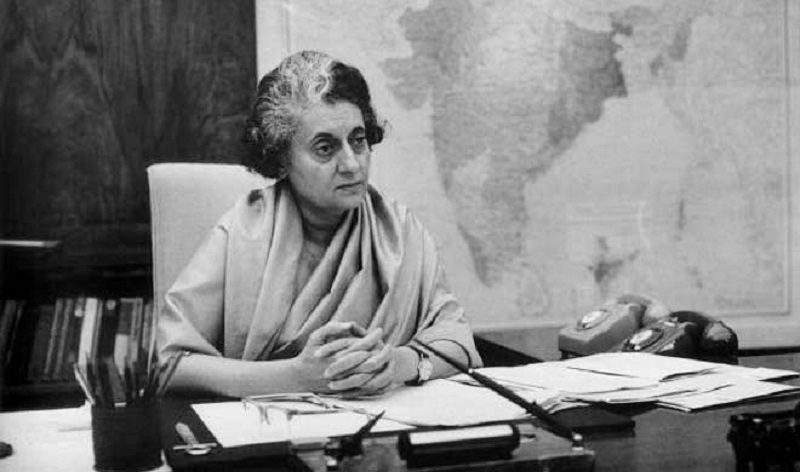
Scared of losing the power, Indira imposed the Emergency on the midnight of June 25 and proscribed as many as 27 organizations including the RSS and the Jamat-e-Islami and put hundreds of thousands of RSS swayamsevaks behind the bar for no fault of theirs. Leaders of the various political parties including Atal Bihari Vajpayee, Lal Krishna Advani were pcked up at the “midnight knock” and whisked away to different locations to spend their time in incarceration.
Emergency Declaration signed by the then President Fakruddin Ali Ahmed gave blanket powers to the government, suspended all the rights of the citizens including the right to life endowed to the citizens by the Constitution and censorship was imposed on the media. Most newspapers came out with 'Blank" Editorials next day.
A study about the role the RSS and its Sarsanghchalak Balasaheb Devras played in restoring democracy in India would prove beneficial for the posterity. It is now two generations past the emergency and it is time they should be informed correctly about such events.
Today if our life is better and we can enjoy all the freedoms including the freedom of speech and expression (that includes leveling unfounded criticism against the RSS and calling names to the Prime Minister), it is because of the RSS and Devras. But hardly any honest, impartial writer has ever credited the organization which had a very important role in forcing Indira Gandhi to withdraw Emergency and restore democracy in India.
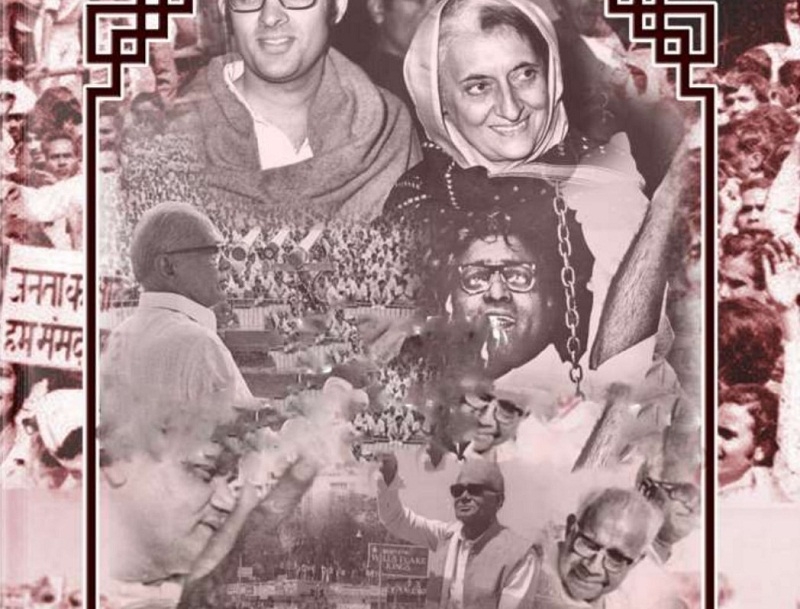
In the occasion of the 30th anniversary of Emergency Dr. Usha Mehta (2007) published a book on the fight against emergency. Barring the Socialists accounts the book hardly mentions the RSS and its role. But be aware that this is not the complete historical truth. “One man Churchil and the twenty miles of English Channel stood between Hitler and victory”, said Devras drawing a parallel with the Indian Emergency “In the same manner I will say one man Jai Prakash and the RSS stood between the dictatorship and democracy”. If there are any literal truths in the era of the emergency this one is the most conspicuous of them. However, Devras did not take the entire credit for himself.
‘The Economist’ of London wrote on December 4, 1976: “The underground campaign against Mrs Gandhi claims to be the only non-left wing revolutionary force in the world, disavowing both bloodshed and class struggle. Indeed, it might even be called right wing since it is dominated by the Hindu communalist party, Jan Sangh and its ‘cultural’ (some say paramilitary) affiliate the RSS. But its platform at the moment has only one non-ideological plank; to bring democracy back to India. The ground troops of this operation (the underground movement), consist of tens of thousands of cadres who are organized to the village level into four men cells. Most of them are RSS regulars, though more and more new young recruits are coming in. The other underground parties which started out as partners in the underground have effectively abandoned the field to Jan Sangh and RSS.”
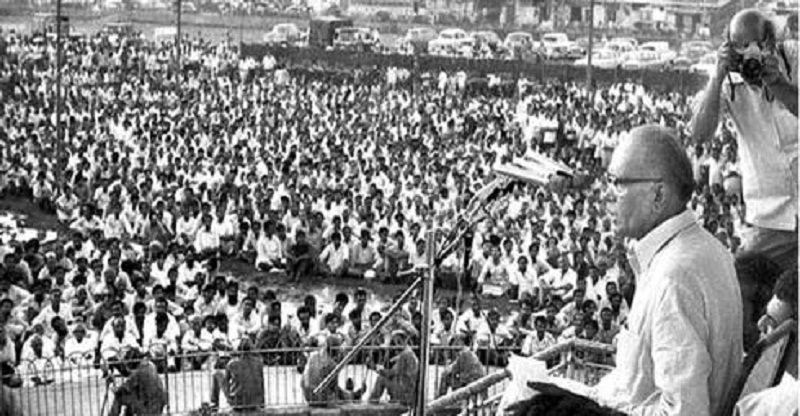 The late Jai Prakash Narain (JP) addressing a mamoth rally
The late Jai Prakash Narain (JP) addressing a mamoth rally
Soon after the emergency was declared, large number of RSS leaders and cadres were arrested. Balasaheb Devras was arrested at Nagpur railway station and incarcerated in Yerwada Jail near Pune. The jails of the country were flooded with RSS swayamsevaks. According to “The People versus Emergecy: A saga of Struggle” the number of RSS swayamsevaks detained under MISA was 23,015 including 22938 male and 77 female activists. The number of RSS activists arrested for offering satyagraha during Emergency was 44965 while only 9655 people of other parties offered satyagraha.
The capacity and strength of RSS can be gauged from the confession of Indira Gandhi. In spite of all the efforts to suppress the RSS Indira Gandhi had to admit, “We were not able to capture even 10 per cent of the RSS workers. They all have gone underground and the RSS did not disperse even after the ban, on the contrary it was striking roots in new areas like Kerala”. (The People Versus Emergency: A Saga of Struggle, 1991, pg 21)
Editor of Modern Review M C Subramaniam wrote: “Among the groups which carried on this work with heroic persistence the RSS group stands out for its special mention. In organizing satyagraha, in maintaining the all-India communication network, in quietly collecting money to finance the movement, in arranging distribution of literature without any bottleneck and in offering help to fellow prisoners even of other parties and other faiths, they proved that they constitute the nearest answer to Swami Vivekananda’s call for an army of sanyasins to take up social and political work in this country. They are a constructive force who has won the admiration of fellow political workers and respect of even their erstwhile opponents.” (Ibid)
Dr Shivram Karanth, too, said: “When elections were announced the one anxiety that filled my mind was , who are the persons who will carry the message of freedom to the people and make them aware of the things at stake? The workers of RSS came forward in thousands and my anciety was set at rest. Even prior to elections the main burden of the struggle was borne by them. It is they who had kept up people’s morale. More than 80 per cent of the fighting cadres had been drawn from the RSS. I have personally seen thousands of their youngmen solely inspired by a spirit of idealism, without any desire or expectation in return, plunging into the struggle. Often they had nothing to eat, no place to rest, but their zeal remained unabated.” (Ibid)
The Satyagraha and RSS: The RSS defied the ban and offered satyagraha. It was a great irony that those who claimed their inheritance from Gandhi and his values openly defiled them while the RSS that was accused of violence successfully adhered to the Gandhian path. Thousands of RSS swayamsevaks offered satyagraha, distributed anti-emergency literature to the people, and collected funds to support the families of those who were behind the bars.
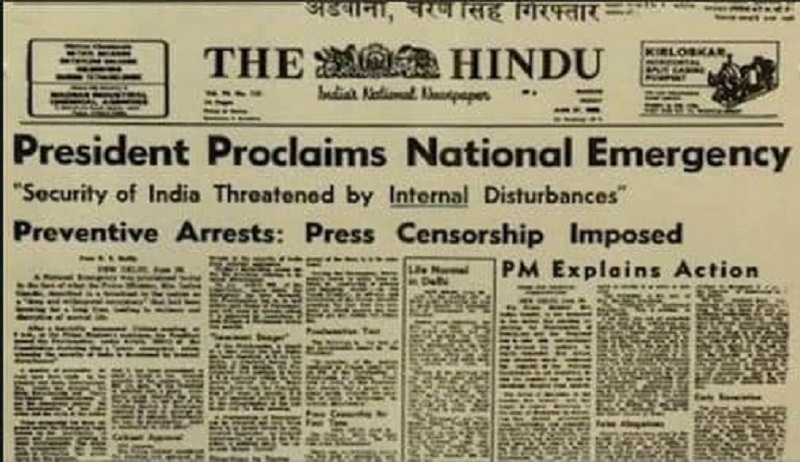
Opposing the dictatorship of the Emergency became the natural duty of the RSS. RSS did not confine itself to getting the ban lifted but took upon it the herculean task of restoring the democratic polity. It also even rejected a conditional proposal from Indira Gandhi on lifting the ban. The restoration of democracy was given utmost importance. Even more than getting the ban on RSS lifted. The 1977 elections were thus viewed as the best available opportunity for this. With the initiative of Sangh and guidance of JP, the non-Congress opposition parties came together forming Janata Party and the RSS threw its weight behind it.
The RSS was at the vanguard of the mass movement of peaceful satyagraha, the famous Gandhian instrument best used by its cadres and leaders.
Devras aptly summarized the role RSS played in this struggle against emergency. Regarding a World War II incident involving Hitler and his army it is said: “One man Churchill and 20 miles of English Channel stood between Hitler and his victory”. Similarly regarding emergency Devras said: “One man Jai Prakash and the RSS stood between the dictatorship and democracy”.
The Janata Party came to power in 1977 and restored the democracy, reinstated all the fundamental rights of the citizens and ensured that at no point of time emergency like measures could be imposed in future. That the Janata Party experiment did not last long is another story. But the primary responsibility of breaking the Janata Party goes to the Socialists. They derived a certain kind of perverted pleasure from destroying, dividing and running through something that was doing well. The same attitude prevailed in this instance also. In the recent times the Left parties played a similar role with respect to the UPA government in 2007.
If today leaders like Rahul Gandhi and his ilk vomits venom against the RSS day in and day out it is because of the same organization’s invaluable contribution and sacrifice of its hundreds of dedicated and committed swayamsevkas. Everyone must understand it, sooner the better.






